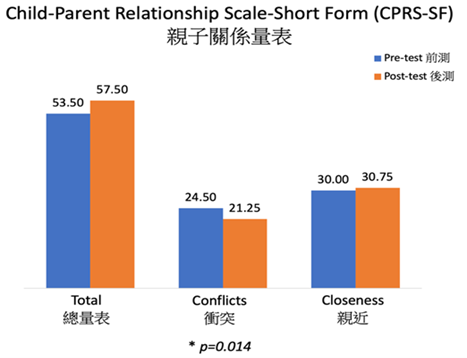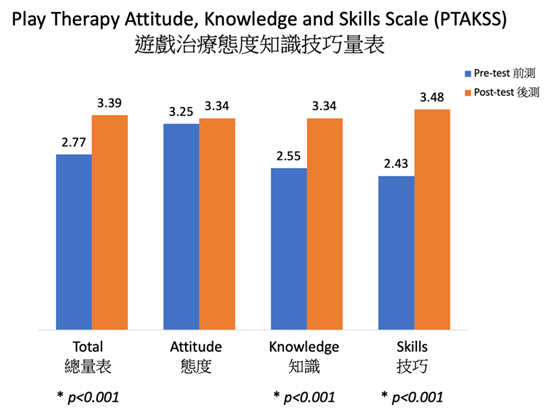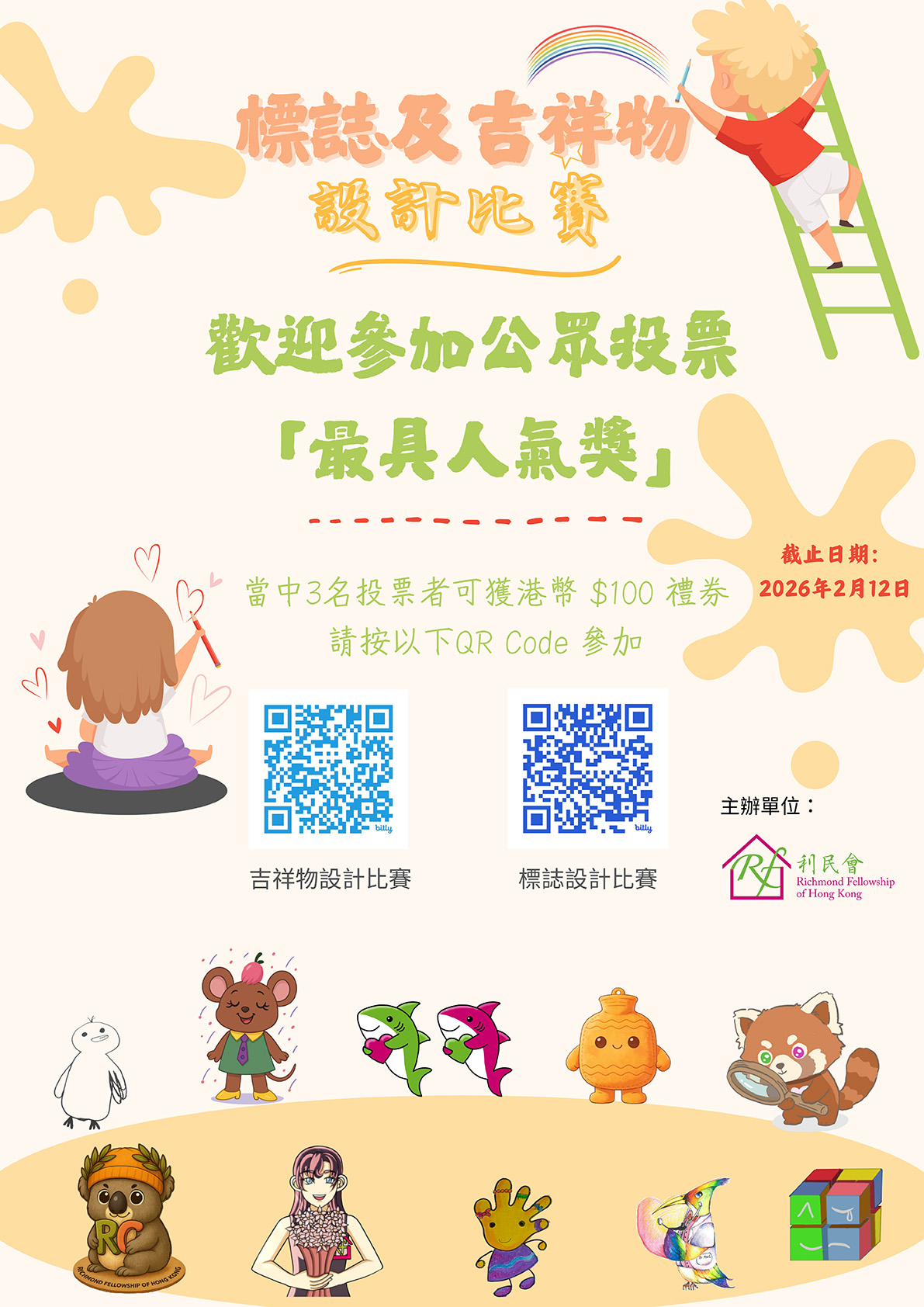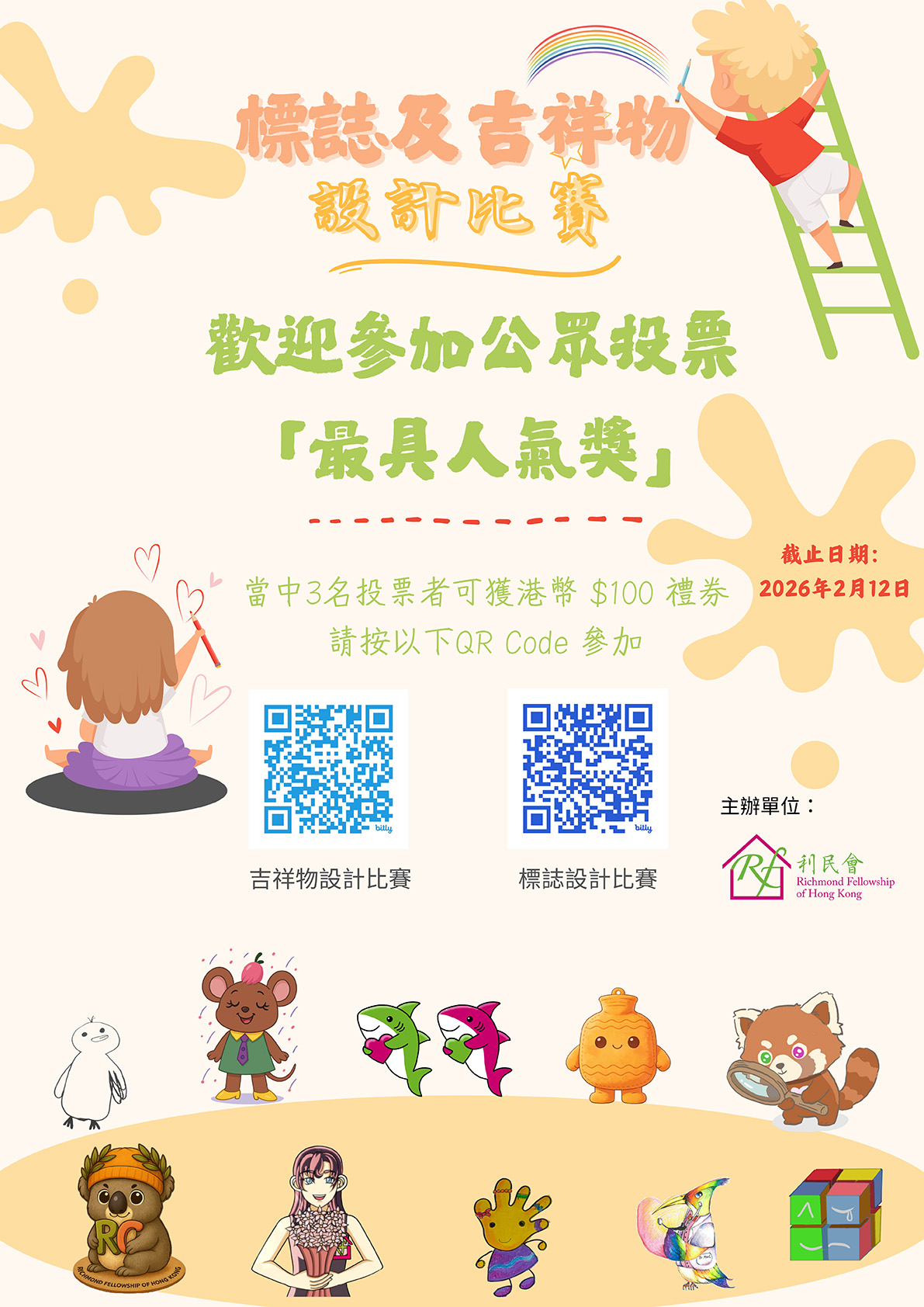智叻精靈
背景及簡介
智叻精靈 (Mental Health Smarties) 由香港救助兒童會贊助及支持。此計劃旨在透過分層護理模式 (Stepped-care Model),降低兒童和家長的焦慮和憂鬱水平,提高他們對精神健康重要性的認識。
計劃時期
2020年8月- 2021年10月
目標人群
6歲- 12歲兒童及其家長、社工、和前線員工。
目的
- 鼓勵家庭友善的教養方式以及運用父母和孩子之間有效的互動方式。
- 為父母及其孩子提供有效的溝通技巧。
- 透過建立正向的親子關係,提高大眾對精神健康重要性的關注。
方法
計劃提供了一系列活動。活動前後使用已經過驗證的問卷和量表[1-8]來評估成效。
活動
家長線上講座
- 由社工、精神科醫生和臨床心理學家主講
- 三個主題:「由愛自己開始」、「親子溝通零距離」及「創造雙贏的親子溝通」
家長支援小組
- 共十節以減輕家長的壓力
親子遊戲興趣班
- 共二十五節,包含親子遊戲和節日慶祝活動
治療小組
- 共八節由心理治療師利用藝術、音樂和戲劇進行
深入輔導
- 由註冊遊戲治療師帶領,以改善親子關係並減少衝突
遊戲治療專業培訓
- 兩天的全日培訓,教授以遊戲為導向的治療技巧
群眾活動:
- 製作了八集有關親子正面精神健康的網上影片,提供予大眾、黃大仙和東區的中小學生和家長。
- 透過Facebook貼文、WhatsApp 貼圖和桌上遊戲宣傳正向的親子關係,促進兒童和家長的精神健康。
結果
- 在參加家長支援小組後,家長的壓力顯著下降(p = 0.007)。

- 參加治療小組後,父母的精神困擾(p = 0.006)和憂鬱(p = 0.014)顯著減少。


- 在接受深入輔導後,父母認為與子女之間的衝突顯著減少(p = 0.014)。

- 經過遊戲治療專業培訓後,社工和前線精神健康工作者對遊戲治療的整體理解(p < 0.001)、知識(p < 0.001)和技巧(p < 0.001)都有顯著提升。

- 在焦點小組訪談中,家長透露治療小組和家長支援小組有助於舒解壓力、學習有效的育兒技巧以及獲得其他家長的相互支持。另外,與孩子的親密程度和溝通也得到了改善。
結論
計劃有助於顯著減少父母的壓力和憂鬱,以及兒童與父母之間的衝突。透過各種活動,向參與者和公眾傳播了精神健康的重要性、有效的親子溝通和育兒技巧的重要訊息。可藉推廣類似的活動,以擴展提供予兒童和家長的服務。
參考文獻
- Ngai, F. W., Chan, S. W. C., & Holroyd, E. (2007). Translation and validation of a Chinese version of the Parenting Sense of Competence Scale in Chinese mothers. Nursing Research, 56(5), 348-354.
- Kessler, R. C., Andrews, G., Colpe, L. J., Hiripi, E., Mroczek, D. K., Normand, S. L., et al. (2002). Short screening scales to monitor population prevalences and trends in non-specific psychological distress. Psychological Medicine, 32(6), 959-976.
- Driscoll, K., & Pianta, R. C. (1992). Child-parent relationship scale. Journal of Early Childhood and Infant Psychology.
- Karcher, M.J. (2007). The Hemingway – Measure of Adolescent Connectedness: A manual for interpretation and scoring. Unpublished manuscript, University of Texas at San Antonio. Retrieved from www.adolescentconnectedness.com
- Tam, K. K., Chan, Y. C., & Wong, C. K. M. (1994). Validation of the parenting stress index among Chinese mothers in Hong Kong. Journal of Community Psychology, 22(3), 211-223.
- Kao, S. C., & Landreth, G. L. (1997). Evaluating the impact of child-centered play therapy training. International Journal of Play Therapy, 6(2), 1.
- Moussa, M.T., Lovibond, P.F. & Laube, R. (2001). Psychometric properties of a Chinese version of the short Depression Anxiety Stress Scales (DASS21). Report for New South Wales Transcultural Mental Health Centre, Cumberland Hospital, Sydney.
- Chorpita, B. F., Yim, L., Moffitt, C., Umemoto, L. A., & Francis, S. E. (2000). Assessment of symptoms of DSM-IV anxiety and depression in children: A revised child anxiety and depression scale. Behaviour Research and Therapy, 38(8), 835-855.
背景及簡介
智叻精靈 (Mental Health Smarties) 由香港救助兒童會贊助及支持。此計劃旨在透過分層護理模式 (Stepped-care Model),降低兒童和家長的焦慮和憂鬱水平,提高他們對精神健康重要性的認識。
計劃時期
2020年8月- 2021年10月
目標人群
6歲- 12歲兒童及其家長、社工、和前線員工。
目的
- 鼓勵家庭友善的教養方式以及運用父母和孩子之間有效的互動方式。
- 為父母及其孩子提供有效的溝通技巧。
- 透過建立正向的親子關係,提高大眾對精神健康重要性的關注。
方法
計劃提供了一系列活動。活動前後使用已經過驗證的問卷和量表[1-8]來評估成效。
活動 |
家長線上講座
|
家長支援小組
|
親子遊戲興趣班
|
治療小組
|
深入輔導
|
遊戲治療專業培訓
|
群眾活動:
|
結果
- 在參加家長支援小組後,家長的壓力顯著下降(p = 0.007)。

- 參加治療小組後,父母的精神困擾(p = 0.006)和憂鬱(p = 0.014)顯著減少。


- 在接受深入輔導後,父母認為與子女之間的衝突顯著減少(p = 0.014)。

- 經過遊戲治療專業培訓後,社工和前線精神健康工作者對遊戲治療的整體理解(p < 0.001)、知識(p < 0.001)和技巧(p < 0.001)都有顯著提升。

- 在焦點小組訪談中,家長透露治療小組和家長支援小組有助於舒解壓力、學習有效的育兒技巧以及獲得其他家長的相互支持。另外,與孩子的親密程度和溝通也得到了改善。
結論
計劃有助於顯著減少父母的壓力和憂鬱,以及兒童與父母之間的衝突。透過各種活動,向參與者和公眾傳播了精神健康的重要性、有效的親子溝通和育兒技巧的重要訊息。可藉推廣類似的活動,以擴展提供予兒童和家長的服務。
參考文獻
- Ngai, F. W., Chan, S. W. C., & Holroyd, E. (2007). Translation and validation of a Chinese version of the Parenting Sense of Competence Scale in Chinese mothers. Nursing Research, 56(5), 348-354.
- Kessler, R. C., Andrews, G., Colpe, L. J., Hiripi, E., Mroczek, D. K., Normand, S. L., et al. (2002). Short screening scales to monitor population prevalences and trends in non-specific psychological distress. Psychological Medicine, 32(6), 959-976.
- Driscoll, K., & Pianta, R. C. (1992). Child-parent relationship scale. Journal of Early Childhood and Infant Psychology.
- Karcher, M.J. (2007). The Hemingway – Measure of Adolescent Connectedness: A manual for interpretation and scoring. Unpublished manuscript, University of Texas at San Antonio. Retrieved from www.adolescentconnectedness.com
- Tam, K. K., Chan, Y. C., & Wong, C. K. M. (1994). Validation of the parenting stress index among Chinese mothers in Hong Kong. Journal of Community Psychology, 22(3), 211-223.
- Kao, S. C., & Landreth, G. L. (1997). Evaluating the impact of child-centered play therapy training. International Journal of Play Therapy, 6(2), 1.
- Moussa, M.T., Lovibond, P.F. & Laube, R. (2001). Psychometric properties of a Chinese version of the short Depression Anxiety Stress Scales (DASS21). Report for New South Wales Transcultural Mental Health Centre, Cumberland Hospital, Sydney.
- Chorpita, B. F., Yim, L., Moffitt, C., Umemoto, L. A., & Francis, S. E. (2000). Assessment of symptoms of DSM-IV anxiety and depression in children: A revised child anxiety and depression scale. Behaviour Research and Therapy, 38(8), 835-855.





